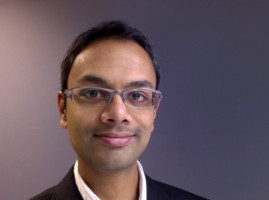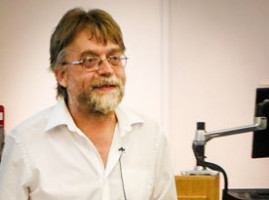Brian Kelly
Brian Kelly is the main organiser of the IWMW 2014 event. Brian is the Innovation Advocate at Cetis, University of Bolton. Brian established the IWMW series of events in 1997 and has been chair or co-chair of the event ever since.
Brian established the event while worked at UKOLN, University of Bath. In October 2013 he started work as Innovation Advocate at Cetis, University of Bolton. Although, following the cessation of core funding from Jisc, the sustainability of the IWMW event was uncertain, thanks to the support of Cetis and Netskills and the sponsors of the event, Brian has been able to ensure this popular event continues.
Contact details
- Institutional Web site: www.cetis.ac.uk
- Blog: ukwebfocus.wordpress.com
- Email: ukwebfocus@gmail.comk
- Twitter: @briankelly
- Google+: http://goo.gl/SjVgA or http://gplus.to/ukwebfocus
- LinkedIn: ukwebfocus
Brian Kelly gave the opening and closing plenary sessions.

Tracy Playle
Prior to founding Pickle Jar Communications in 2007, Tracy worked for the University of Warwick in the UK. Her work there embraced internal and external communications, web communications, press and media relations, broadcast PR, event management, copywriting and business development and planning.
She was previously Head of Research-TV, a broadcast PR service working on behalf of many universities and research organisations to help them raise the profile of their research on television channels around the world. During her time there she oversaw the production and distribution of more than 100 video news releases, achieving over 1500 broadcasts on television channels (including major international news networks) around the world. During this time she began to explore more opportunities for online video communications, and thus her move towards a specialism in digital media began.
Contact details
- Twitter: @tracyplayle
- Website: picklejarcommunications.com
- Profile: http://www.picklejarcommunications.com/our-team/
Plenary talk
Tracy gave the opening plenary talk (#P1) on “Why you don’t need a social media plan and how to create one anyway” from 14.30-15.15 on Wednesday 16 July 2014.

Paul Boag
Paul Boag has been working with the web since 1994. He is now co-founder of the digital agency Headscape, where he works closely with clients to establish their web strategy.
Paul is a prolific writer having written Digital Adaptation, Website Owners Manual, Client Centric Web Design and numerous articles for publications such as .net magazine, Smashing Magazine and the econsultancy.com.
Paul also speaks extensively on various aspects of web design both at conferences across the world and on his award winning web design podcast boagworld.
Contact details
- Email: paul@boagworld.com
- Twitter: @Boagworld
- Website: www.headscape.co.uk/people/paul-boag.html
Plenary talk
Paul gave a plenary talk (#P2) on “Digital Adaptation: Time to Untie Your Hands” from 15.45-16.30 on Wednesday 16 July 2014.
Ranjit Sidhu
Ranjit Sidhu (or Sid) is founder of statistics into Decisions (or SiD). Around 1998 Ranjit fell into the internet space whilst trying to run away from a career in law. Since then he has worked at several Internet based companies, but has found his niche in analysis and helping clients understand what is going on in the internet ether and how to use that information to improve what they do. Ranjit is currently working with 15 UK universities.
Contact details:
- Email: ranjit@sidspace.info
- Twitter: @rssidhu
Plenary talk
Ranjit gave a plenary talk (#P3) on “‘You are ALL so weird!’ University sector analysis and trends” from 16.30-17.15 on Wednesday 16 July 2014.

Sharif Salah
Sharif Salah has worked with Google technologies since early 2009 when he began a role as a Google Apps technical lead in Higher Education. Along the way this has given him the good fortune to be involved in evangelising extensively and affecting change and progress on the adoption and integration of Google Apps, Cloud Storage and App Engine both internationally and locally. More recently he has become immersed in and advocate on Google Cloud Platform, open source software as well as mobile app development and strategy.
Sharif is a frequent public speaker and spends time working with both education and startups on making the most of their move to the cloud. He is a Google Developer Expert for 2014 and a Google Qualified Developer for Google Cloud Platform.
Contact details:
- Twitter: @sharif_salah
- Google+: https://plus.google.com/u/0/103057053147910473099
- Website: www.port.ac.uk
Plenary talk
Sharif gave a plenary talk (#P4) on “
Ross Ferguson
Ross Ferguson is the Head of the Digital Marketing and Communications team at the University of Bath.
The role is responsible for the strategic direction and development of the University’s digital marketing and communications. Prior to joining the University, Ross managed digital products and services for organisations in the public and private sectors, including the Foreign & Commonwealth Office and the Government Digital Service.
Contact details
- Email: r.a.ferguson@bath.ac.uk
- Twitter: @rossferg
- Personal Web site: www.rossferguson.com
- Organisational Web site: www.bath.ac.uk
Plenary talk
Ross gave a plenary talk (#P4) on “Using the start-up playbook to reboot a big university website” from 09.45-10.30 on Thursday 17 July 2014.
Neil Allison
Neil Allison is Head of User Experience for the University Website Programme at the University of Edinburgh.
He believes everyone has responsibility for user experience, and with a background in education and training, works to give colleagues the skills and confidence to conduct their own research and inform their work. He is an active member of the Scottish chapter of the UX Professionals Association.
Neil is currently playing the role of product owner in the agile development of a new University CMS and leading the evolution of the website’s information architecture.
Contact details:
- Twitter: @usabilityed
- Blog: www.usability-ed.blogspot.co.uk
- LinkedIn: neilallison
- Web site: www.ed.ac.uk/website-programme
Plenary talk and workshop session
Neil gave a plenary talk (#P5) on “Marketing is dead, long live UX” from 11.00-11.45 on Thursday 17 July 2014. He also facilitated with Bruce Darby a workshop session (#A3) on “Making Personas Work” (session A3) from 16.00-17.30 on Thursday 17 July 2014.
Martin Hawksey
Martin Hawksey has held advisory roles within the UK educational technology sector for a number of government funded services. In these roles he has supported staff in the exploration and adoption of innovative approaches to teaching and learning. Martin was an early adopter of Google Apps Script recently been recognised as a Google Developers Expert (GDE) and this tool regularly features in the solutions he publishes on his personal blog.
As Chief Innovation, Technology and Community Officer at the Association for Learning Technology (ALT) his work is focused on the development of ALT’s member services exploring how connectivist approaches can be used to support the community. This includes the application of data aggregation and dissemination techniques using existing open source platforms such as WordPress.
Contact details
- Twitter: @mhawksey
- Blog: http://mashe.hawksey.info/
- LinkedIn: mhawksey
- Google+: +MartinHawksey
- Slideshare: mhawksey
- StackOverflow: mhawksey
Plenary talk and workshop session
Martin gave a plenary talk (#P6) on “Hyper-connectEd: Filling the vacuum by switching from blow to suck” from 14.00-14.45 on Thursday 17 July 2014. He also facilitated a workshop session (#A1) on “Rapid Development: Analytics reporting powered by Google Apps Scripts” (session A2) from 16.00-17.30 on Thursday 17 July 2014.
Chris Gutteridge
Christopher Gutteridge works as the Linked Open Data Architect at the University of Southampton. He is lead developer for data.ac.uk which was launched in March 2013. In 2012 he accepted the Times Higher Education award for “Outstanding IT Initiative of the Year” for the data.southampton.ac.uk project. Before working on Linked Open Data services, Chris was lead developer for EPrints. Chris is a strong supporter of Open Standards, Research, Access and Data; but puts the emphasis on pragmatic rather than perfect solutions.
Contact details
- Email: cjg@ecs.soton.ac.uk
- Professional details: http://users.ecs.soton.ac.uk/cjg/
- ECS Web Team Blog: http://blog.soton.ac.uk/webteam/
- Wikipedia entry: http://en.wikipedia.org/wiki/Christopher_Gutteridge
Plenary talk and workshop session
Chris gave a plenary talk (#P8) with Andrew Milsted on “What Does The Data Tell Us About UK University Web Sites?” from 14.45-15.30 on Thursday 17 July 2014. He also facilitated with Andrew Milsted a workshop session (#A7) on “Working with data.ac.uk, Creating your Institution’s OPD (Organisational Profile Document)” from 16.00-17.30 on Thursday 17 July 2014.
Andrew Milsted
Andrew Milsted works at the University of Southampton.
Plenary talk and workshop session
Andrew gave a plenary talk (#P8) with Christopher Gutteridge on “What Does The Data Tell Us About UK University Web Sites?” from 14.45-15.30 on Thursday 17 July 2014. He also facilitated with Christopher Gutteridge a workshop session (#A7) on “Working with data.ac.uk, Creating your Institution’s OPD (Organisational Profile Document)” from 16.00-17.30 on Thursday 17 July 2014.

Martin Morrey
Martin Morrey is the manager of the Web Integration Team at the University of Edinburgh, with responsibility for portal, wiki, web hosting and web development services. He has been working with the web for 18 years, and the mobile web for 14 years (remember WAP?).
He presented at EDUCAUSE last year on “Adding Analytics to the University Portal.”
Formerly an e-learning specialist and software entrepreneur, he won a SMART award in 2000 to develop a mobile-learning system and was co-founder of Intrallect Ltd.
Contact details:
- Twitter: @martinmorrey
- LinkedIn: martinmorrey
- Website: www.ed.ac.uk/is
Plenary talk
Martin gave a plenary talk (#P9) on “Rebooting MyEd – Making the Portal Relevant Again” from 09.30-10.15 on Friday 18 July 2014.

Hiten Vaghmaria
Hiten Vaghmaria is Head of Digital Development at the University of Westminster, where he leads a team responsible for the operation and development of web-based services for students and staff. Previously, Hiten has worked as a Service and Product Manager for the University of Edinburgh and the BBC.
Contact details
- Email: h.vaghmaria@westminster.ac.uk
- Institutional Web site: http://westminster.ac.uk/
Plenary talk
Hiten gave a plenary talk (#P10) on “Allocating Work: Providing Tools for Academics” from 10.15-11.00 on Friday 18 July 2014.

David Cornforth
David Cornforth is a designer living in Newcastle. He spends his time designing and building digital products that involve a mix of interaction design, content strategy, web development and project management. He is Developer/Analyst for Jisc infoNet which is based at Northumbria University.
Contact Details
- Organisational Web site: http://www.jiscinfonet.ac.uk/
- Blog: http://www.dc86.co.uk/
- Twitter: @dc86
Workshop session
David Cornforth and Richard West facilitated a workshop session on “Reframing Content Strategy” (session A2) from 16.00-17.30 on Thursday 17 July 2014.

Richard West
Richard West is passionate about user experience and great content.
He leads a team of content editors at Jisc keeping their site focused on their users. He is also working on a project to simplify and unify Jisc’s portfolio of 80+ sites.
Previously he was at UWE Bristol managing ‘soft’ communications to their enquirers, applicants, freshers and alumni. He also launched and managed their Twitter and Facebook presences.
Contact Details
- Email: r.west@jisc.ac.uk
- Twitter: https://twitter.com/rvwest
- Linkedin: http://uk.linkedin.com/in/rvwest/
- Organisational website: http://www.jisc.ac.uk/
Richard West and David Cornforth facilitated a session on Reframing Content Strategy (session A2) from 16.00-17.30 on Thursday 17 July 2014.

Bruce Darby
Bruce Darby is a project manager for the University Website Programme and UX lead in an agile development project to build a new Content Management System for the University of Edinburgh. He is using personas in this project every day.
Bruce also has 10 years experience supporting disabled students with assistive technology and accessibility testing of websites and software.
Contact Details
- Email: bruce.darby@ed.ac.uk
- Twitter: @technomob
- LinkedIn: brucedarby
- Web site: www.ed.ac.uk/website-programme
Workshop session
Bruce Darby facilitated with Neil Allison a workshop session on “Making Personas Work” (session A3) from 16.00-17.30 on Thursday 17 July 2014.
Richard Prowse
Richard Prowse is Web Content Manager at the University of Bath, where he leads a team responsible for the management and creation of content.
Co-founder of Bath’s first content strategy meetup. He is passionate about content, information architecture and user experience.
He has previously spoken at IWMW events and regularly posts on the subject of content strategy on his personal blog Content Bear.
Contact details
- Email: r.w.prowse@bath.ac.uk
- Twitter: @richprowse
- LinkedIn: richprowse
- Organisational website: http://www.bath.ac.uk/
- Website: http://www.contentbear.co.uk/
Workshop session
Richard facilitated a workshop session on “Learning to COPE (Create, Once, Publish Everywhere)” (session A4) from 16.00-17.30 on Thursday 17 July 2014.
Helen Sargan
Helen Sargan has been a webmaster since 1994, and in IT since 1990. A career before that as an editor in scientific and medical textbooks and journals gives a different perspective on information. 2012/13 saw the redesign of the University web templates and their installation into Drupal and Plone, and 2014 saw us switch to Funnelback as our site search engine. Although currently absorbed in supporting the new templates and managing and supporting a Plone-based content management service that uses them, the process also includes encouraging people to use analytics and introducing them to what the analytics show about the way their sites are being used.
Contact details
- Email: hvs1001@cam.ac.uk
- Institutional Web site: http://www.cam.ac.uk/
Workshop session
Helen facilitated a workshop session on “Google Analytics For Beginners” (session A5) from 16.00-17.30 on Thursday 17 July 2014.
Mark Johnson
Mark Johnson comes from a web development background having worked in Further Education as a Moodle developer since 2009. His work has seen him contribute code to the open source VLE as well as starting his own open source projects. He also presents The Ubuntu Podcast and organises OggCamp, a free culture unconference. Mark joined OSS Watch in 2012 and uses the experience he’s gained to advise and support developers who want to contribute to the open source community.
Contact details
- Email: mark.johnson@it.ox.ac.uk
- Twitter: @marxjohnson
- Web site: http://oss-watch.ac.uk/
- Blog: http://osswatch.jiscinvolve.org/
Workshop session
Mark facilitated a workshop session on “How to Buy Free Software” (session A6) from 16.00-17.30 on Thursday 17 July 2014.
Mike Nolan
Mike Nolan is Head of Web Services at Edge Hill University where he is responsible for development of external Web sites and a portal service for staff and students.
Michael has previously facilitated sessions at IWMW events on a variety of topics and regularly posts about HE web development topics on the Edge Hill Web Services blog.
Contact details
- Email: Michael.Nolan@edgehill.ac.uk
- Twitter: @MikeNolan
- LinkedIn: mjnolan
- Blog: http://blogs.edgehill.ac.uk/webservices/
Workshop and panel session
Mike Nolan facilitated a workshop session on “WordPress as a CMS” (session A8) from 16.00-17.30 on Thursday 17 July 2014. He also took part in a panel session on “What is our vision for the institutional web and can we implement that vision?” from 11.30-12.15 on Friday 18 July 2014.









